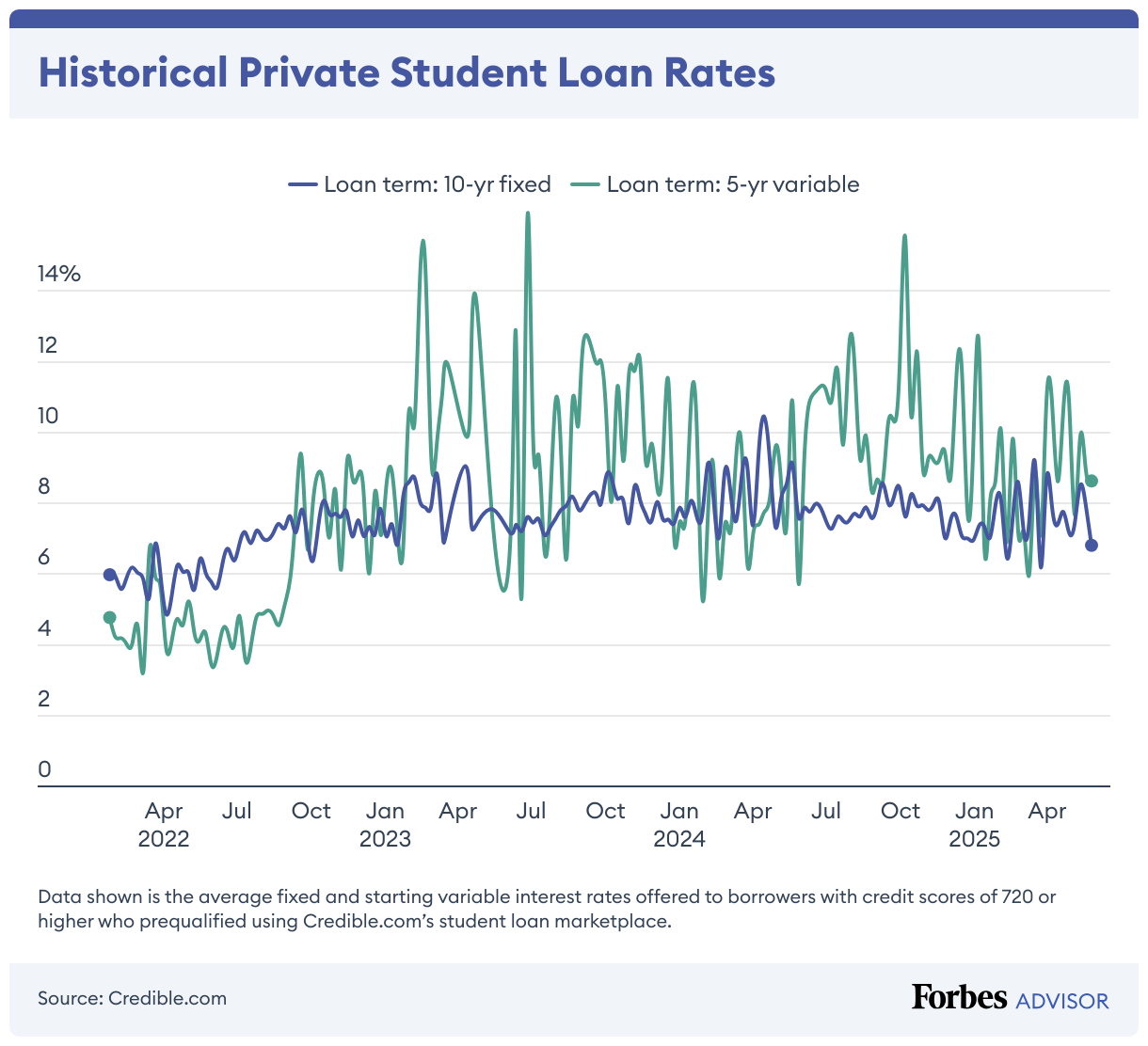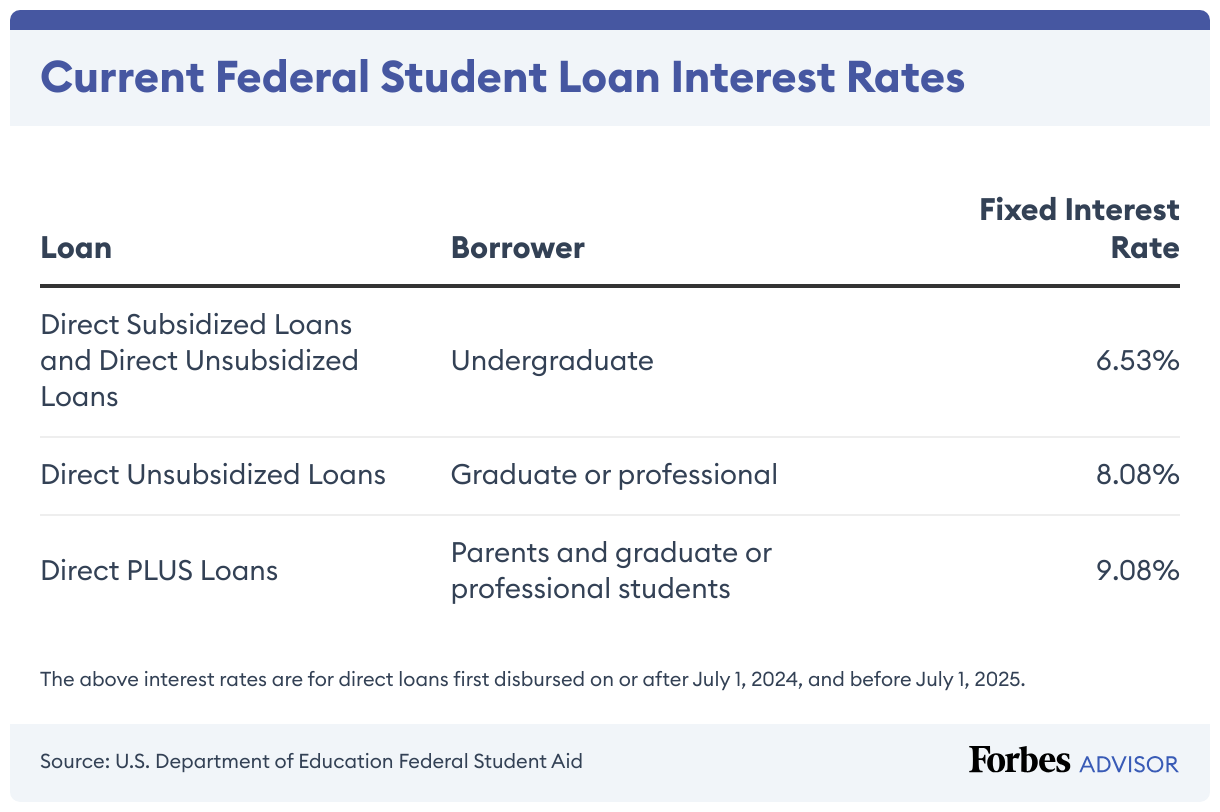Rates on 10-year, fixed-rate private student loans dropped last week. If you’re interested in picking up a private student loan, you can still get a relatively low rate.
Average Private Student Loan Interest Rates

From May 26 to May 31, the average fixed interest rate on a 10-year private student loan was 6.81% for borrowers with a credit score of 720 or higher who prequalified on Credible.com’s student loan marketplace. On a five-year variable-rate loan, the average interest rate was 8.63% among the same population, according to Credible.com.
These rates are accurate as of the week of May 26, 2025.
Related: Best Private Student Loans
Fixed-Rate Loans
Last week, the average fixed rate on 10-year loans fell by 1.12% to 6.81%. The week prior, the average stood at 7.93%.
Borrowers currently in the market for a private student loan will receive a lower rate than they would have at this time last year. At this time last year, the average fixed rate on a 10-year loan was 9.11%, 2.30% higher than today’s rate.
Let’s say you financed $20,000 in student loans at today’s average fixed rate. You’d pay around $230 per month and approximately $7,632 in total interest over 10 years, according to Forbes Advisor’s student loan calculator.
Variable-Rate Loans
Last week, the average rate on a variable five-year student loan fell to 8.63% on average from 8.93%.
In contrast to fixed rates, variable interest rates fluctuate over the course of a loan term. Variable rates may start lower than fixed rates, especially during periods when rates are low overall, but they can rise over time.
Private lenders often offer borrowers the option to choose between fixed and variable interest rates. Fixed rates may be the safer bet for the average student, but if your income is stable and you plan to pay off your loan quickly, it could be beneficial to choose a variable loan.
Financing a $20,000 five-year private loan at 8.63% would yield a monthly payment of approximately $412. A borrower would pay $4,695 in total interest over the life of the loan. But the rate in this example is variable, and it could move up or down each month.

How To Get a Private Student Loan
If you reach the annual borrowing limits for federal student loans or if you’re otherwise ineligible for them, private student loans may be a good option. But consider a federal student loan as your first option since the interest rates are typically lower. You’ll also receive more liberal repayment and forgiveness options with federal student loans.
To get a private student loan, you’ll generally need to apply directly through a non-federal lender. You can find private student loans through banks, credit unions and online entities. Nonprofit organizations, state agencies and colleges also offer loans.
If you’re an undergraduate with limited credit history, you’ll generally need to apply with a co-signer who can meet the lender’s borrowing requirements.
Here’s what to consider when applying for a private student loan:
- Make sure you qualify. Private student loans are credit-based, and lenders typically require a credit score in the high 600s. This is why having a co-signer can be particularly beneficial.
- Apply directly through lenders. You can apply directly on the lender’s website, via mail or over the phone.
- Compare your options. Look at what each lender offers and compare the interest rate, term, future monthly payment, origination fee and late fee. Also, check to see if the lender offers a co-signer release so that the co-borrower can eventually come off of the loan.
Shopping for Private Student Loans
When looking for the best private student loan option, take a close look at the overall cost of the loan, including the interest rate and fees. It’s also important to consider the type of help the lender offers if you can’t afford your payments.
Remember, those with good or excellent credit typically get the best rates.
How much should you borrow? Experts generally recommend borrowing no more than you’ll earn in your first year out of college. How much can you borrow? Some lenders cap the amount you can borrow each year, while others don’t. When you’re shopping around for a loan, talk to lenders about how the loan is disbursed and what costs it will cover.
Current Federal Student Loan Interest Rates
If you need to borrow for school, federal student loans are generally the best option. This is because federal loans offer various borrower protections, such as access to income-driven repayment plans and student loan forgiveness programs. Additionally, most federal loans don’t require a credit check or co-signer.

How Lenders Determine Your Rate
The rate you receive depends on whether you’re getting a fixed or variable loan. Rates, in part, are based on your credit profile. Those with higher credit scores often get the lowest rates. But your rate is based on other factors as well. Income and even the degree you’re working on and your career can play a part.
Know the Benefits of Private Student Loans
While private student loans shouldn’t necessarily be your first financial aid option, they can come with a variety of benefits, including the following:
- You can often borrow as much as you need. Some private lenders let you borrow up to your school-certified cost of attendance, minus any previously awarded financial aid.
- You might not have to pay fees. The best private lenders don’t charge origination or disbursement fees, so you won’t have extra charges on your loan in addition to interest.
- Good credit means better interest rates. While your credit score doesn’t matter with most types of federal student loans, it does impact private borrowing. Lenders often offer competitive rates to borrowers with excellent credit or a creditworthy co-signer.
- It’s easy to apply online. Applying for a private student loan is often a quick online process that you can do at any time throughout the school year. Many lenders also let you prequalify for loans online, making it easy to shop around and compare offers from multiple banks.
- International students may be eligible. Some lenders provide loans for international students attending school in the U.S. If you’re an international student, you may have to apply with a U.S.-based co-signer to qualify.
- Your lender may offer useful perks. Depending on the lender, you may qualify for some, from interest rate discounts to cash-back bonuses. Some offer a range of repayment terms, lengthy grace periods, forbearance and deferment options and other borrower protections.